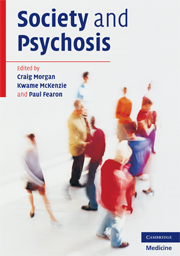Book contents
- Frontmatter
- Contents
- Contributors
- Acknowledgements
- 1 Introduction
- 2 Climate change in psychiatry: periodic fluctuations or terminal trend?
- Part I Theoretical and conceptual foundations
- Part II Social factors and the onset of psychosis
- Part III Social factors and the outcome of psychosis
- Part IV Models and conclusions
- Index
- References
1 - Introduction
Published online by Cambridge University Press: 07 December 2009
- Frontmatter
- Contents
- Contributors
- Acknowledgements
- 1 Introduction
- 2 Climate change in psychiatry: periodic fluctuations or terminal trend?
- Part I Theoretical and conceptual foundations
- Part II Social factors and the onset of psychosis
- Part III Social factors and the outcome of psychosis
- Part IV Models and conclusions
- Index
- References
Summary
Psychiatry has recently rediscovered its roots. It seemed as if its long history of interest in the impact of society on the rates and course of serious mental illness had been forgotten, overtaken by the inexorable advance of neuroscience and genetics. However, as our knowledge of the physiological and genetic processes linked to psychosis has advanced, it has become increasingly clear that social conditions and experiences over the life course are important in the aetiology of psychosis. Old dichotomies and controversies are giving way to genuinely integrated models, in which social, psychological and biological factors are seen to interact over time, culminating in the onset of psychosis. The influence of society extends beyond onset to shape course and outcome, with important implications for public policy and service delivery. In this context, it is useful to take stock of what is currently known about the links between society and psychosis, limitations to this knowledge, unanswered questions and future research priorities. Society and Psychosis aims to do this.
Categories and continua
There have been many attempts to define psychosis. Wing (1978), for example, gave a relatively narrow description: ‘A ‘psychotic’ state is one characterised by delusions or hallucinations, in which the individual is unable to differentiate his grossly abnormal thought processes from external reality and remains unaware of his deficiency.’ (pp. 44–5.) Less restrictive definitions include hallucinatory experiences that the sufferer realises are abnormal and, more broadly still, others include disorganised speech and grossly disorganised behaviour (APA, 1994).
Keywords
- Type
- Chapter
- Information
- Society and Psychosis , pp. 1 - 10Publisher: Cambridge University PressPrint publication year: 2008
References
- 2
- Cited by

